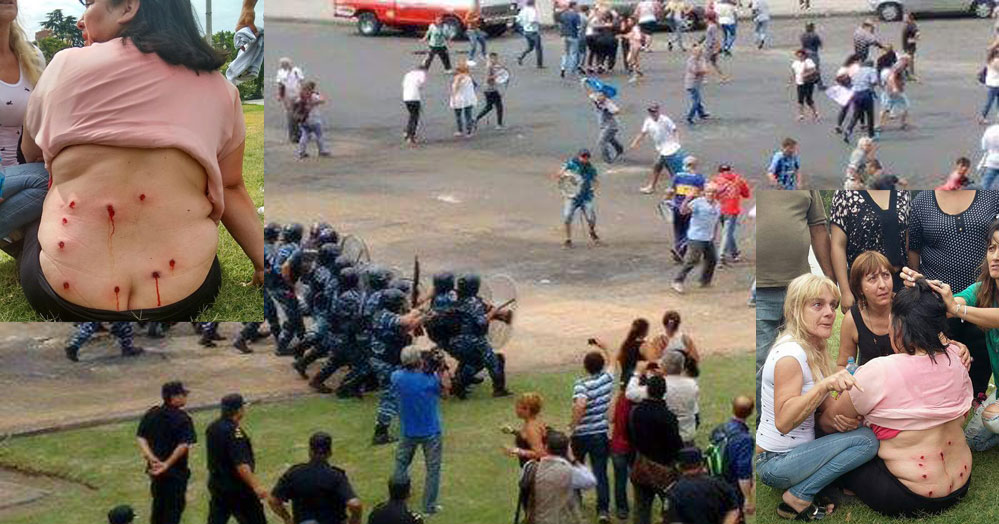Photo: Repression in La Plata, Enfoque Rojo.
Every year from around Christmas through February, Argentina is wrapped in a summer trance. The usual, frenzied pitch of city centres is muffled as if by vast blankets of cotton and sticky heat. Families find reprieve from work by traveling to the coast and mountains, visiting distant family and towns in the interior. This lull often translates into a dialing-down of class struggle–fewer and smaller mobilizations, strikes, political activism–and the left is normally resigned to wait it out, see what breaks through. On the other hand, new governments have historically exploited the summer slumber to push through policies–especially those more likely to meet with popular resistance. The new right-wing government under President Mauricio Macri has proven itself to be no exception.
Austerity of Necessity and Urgency
Within a few weeks in office, Macri has begun to carry out what was already foreshadowed in the electoral race. The executive office has churned out an unprecedented number of “Decrees of Necessity and Urgency,” a mechanism similar to executive actions in the United States. Not to be bothered with keeping up appearances, Macri has bypassed parliament and all other bourgeois democratic institutions to ensure his austerity program. These strong-arm executive measures have so far taken the form of peso devaluation, a hike in energy service fees, and lifting of agro-export tariffs.
With his “anti-narcos, anti-ñoquis” rhetoric, Macri promised to be “tough on crime” and tough on government employees who were ostensibly lazying about, undeservingly living off the toil and taxes of the population. Besides being a delicious, chewy potato dumpling, ñoqui (AKA gnocchi) is a popular term for the layer of family members, friends, and business associates of the political elite, who were given positions for their connections and not required to show up to work. To a certain extent, the concept of “ñoquis” stems from a general resentment of the political caste and their privileged periphery, as well as disillusionment with widespread corruption and nepotism.
At a press conference at the Casa Rosada last Wednesday, Macri declared,”Kirchnerism has done the opposite of what it claimed. The city of Buenos Aires once respected and promoted careers in public service, but Kirchnerists put the state under the service of its own political interests. I want every Argentine to be proud of his or her job and for there to be no more collecting salaries for work that isn’t done. It should be added that despite his moralistic strutting, Macri’s wife Juliana Awada owns a number of fashion companies notorious for their sweatshop conditions.
Make no mistake: Macri is only capitalizing on anti-ñoqui sentiment to carry out frontal attacks on workers. Indeed, he has dismissed government workers in droves, but not to eliminate favoritism and bribery. As pointed out in La Izquierda Diario, “The objective of the government and corporations is to advance and create conditions to impose a new leap in the level of exploitation of the working class.” The state is taking great strides to introduce a new level of precarity and bring labor under submission in order to resolve capitalist economic crisis.
Nationwide Dismissals and Rumblings in La Plata
In a sickening, synchronized show of anti-worker rancor, Macri and his regional counterparts have together brought about a massive wave of dismissals, backed by heavy-handed repression. Over 18 thousand public sector employees nationwide have been stripped of their jobs under the pretext of “contract revision” and “downsizing the state,” and these figures continue to rise. Fifteen hundred were laid off in Posadas, 980 in Quilmes, 900 in Malvinas Argentinas, 1000 in Morón. Over six hundred workers at the Nestor Kirchner Cultural Center (CCK) were barred from their workplace, told that the institution had been completely shut down.
In the city of La Plata alone, Mayor Julio Garro of Macri’s Cambiemos party oversaw the dismissal of 4,500 workers last week. Upon hearing the news, workers protested at the city’s municipal offices and were heavily repressed with tear gas and rubber bullets. The swift and unhesitating crackdown echoed the December 22 Cresta Roja experience, in which Macri’s cops beat up and destroyed the encampment of hundreds of poultry workers who had been fighting for their jobs for over a year.
Repression in La Plata
This past Monday, January 11, a massive demonstration took place in La Plata, the capital of the Province of Buenos Aires. Demonstrators gathered in front of the municipal center to repudiate both the city government’s violent crackdown on protesters in La Plata last week following the announcement that upwards of 4,500 municipal workers would lose their jobs. The protesters denounced the layoffs and demanded that the workers be immediately rehired.
Over five thousand people joined from various groups including trade unions CTA (Central de Trabajadores de la Argentina), SUTEBA, and ATE, human rights organization H.I.J.O.S. (Sons and Daughters for Identity and Justice Against Oblivion and Silence), the “Multisectorial” of La Plata (broad coalition of labor, students, and civic groups), Peronist organizations, populist groups, and far-left parties including the PTS (Partido de los Trabajadores Socialistas) and the PO (Partido Obrero)–both part of the Left and Workers’ Front (FIT). The next day, trade unionists and workers cut off highways in La Plata. The workers have not gotten an answer to their demands.
It is not clear where the chips will fall, how much the devaluation will propel inflation, how many more workers will be without a job. Macri has delivered swift blows to the working class, perhaps with the idea to “hit hard, and see what comes next” to test the limits of his power and balance of forces, and surely to leave workers in worse terms to negotiate in the next “paritarias,” which are industry-wide collective agreements negotiated each year to set wage hikes that keep up with inflation to a lesser or greater degree.
What’s labor’s response? So far, the major confederations and bureaucratic leadership are nowhere to be found. Presenting barely any resistance to the new austerity policies, they have been called out for their incipient “truce’’’ with the Macri administration. While the new regime has begun to make its mark, it remains unclear what the response will be from the working-class and popular sectors as a whole, including the newly unemployed, trade unions, and Kirchnerist student and workers’ organizations.











